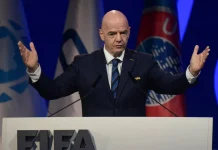The decision to host the FIFA World Cup is always associated with many considerations, including infrastructure, economic capacity, and the ability to handle an international event of such magnitude. However, with increasing global interest in human rights, political situations, and geopolitical affairs, it has also become very important to consider the local politics prevailing within a country before deeming it fit to host the world’s most significant sporting event.
Saudi Arabia’s bid to host the FIFA World Cup in 2034 has invited widespread controversy, especially considering the geopolitics of that country and its associated controversies. These concerns are centered on regional conflicts, human rights abuses, and the larger implications for the globe to let Saudi Arabia host such an international sporting event on such a large scale.
Regional Conflicts and Instability
Saudi Arabia is one of the countries situated in one of the most geopolitically volatile regions globally: The Middle East. For many decades, and in some cases continuing to this day, the region has been engaged in warfare, conflict, sectarian violence, and other forms of unrest; some of which have even involved Saudi Arabia. Hosting a global sporting event within a region of instability raises significant risks to the safety and security of participants, spectators, and officials alike. A 2021 global survey revealed that 62% of respondents disapprove of Saudi Arabia’s human rights practices.
The most intense regional war in which Saudi Arabia is embroiled is the war in Yemen, which has been raging since 2015. Saudi Arabia has led a military coalition against Houthi rebels in Yemen with such destruction, civilian casualties, and humanitarian crisis that even the United Nations branded it as the worst in the world. The involvement of Saudi Arabia in this war has led to international condemnation and allegations of war crimes, as it targets civilian areas and vital infrastructure.
Human Rights Issues
One of the biggest controversies surrounding Saudi Arabia has involved its human rights record for decades. Hosting the FIFA World Cup in 2034 would certainly put a spotlight on the country’s domestic policies, especially the ones involving freedom of speech, rights of women, and treatment of migrant workers. Only recently, Saudi Arabia engaged in a historic set of reforms aimed at modernizing the economy and society under the Vision 2030 initiative. However, these reforms have often been accompanied by severe repression of dissent, and many have criticized the kingdom for using sports as a tool for “sportswashing”—a strategy of hosting major sporting events to distract from domestic human rights abuses. In 2022, Saudi Arabia carried out at least 196 executions, the highest number recorded in a single year in the past three decades.
One of the most glaring examples of this is the imprisonment and harassment of activists who have called for more freedoms and rights within the kingdom. Saudi political repression has taken an even darker turn since the killing of journalist Jamal Khashoggi at the consulate in Istanbul in 2018, which sent shockwaves around the world and drew wide condemnation. Khashoggi murder, concluded by the CIA as likely to have been ordered by Saudi Crown Prince Mohammed bin Salman, is emblematic of the broader issue of political repression in the country.
Women’s rights are another major cause of concern in the country. While some steps have been made, such as women being allowed to drive or attend sporting events, significant gender discrimination prevails in the country. More than two decades after gaining independence, women still suffer from legal and social restrictions limiting their participation in public life, such as the institution of male guardianship that controls their freedom. In a country where half the population is under such restrictions, hosting an event like the World Cup would send a contradictory message to the world, especially when gender equality is very much becoming one of the important issues in global sports.
Another serious issue should be the treatment of the migrant workers. Saudi Arabia, like the rest of the Gulf states, relies heavily on foreign labor-most of which hail from South Asia and Africa. They are exploited, poorly housed, and abused through the system of kafala bound to their employer’s legal status, thereby holding them back from leaving abusive situations.
Political Suppression and Censorship of Freedom of Speech
Freedom of expression is highly restricted in Saudi Arabia. Dissent against the government, public demonstrations, and all criticism of the rule makers are forbidden, and rebels are arrested, tortured, or even hanged in this stifling atmosphere, which brings grave doubts about the happenings of any events regarding the World Cup in such an environment. Would the supporters, players, and journalists be given the freedom to think and say whatever they want or would they be under censoring and spying? This means that fans and journalists from every corner of the globe, with a whole range of political and social opinions, will be there in the host country. Reports suggest that over 51% of migrant workers in Saudi Arabia experience exploitation, poor working conditions, or abuses, particularly under the kafala system.
Sportswashing and FIFA’s Reputation
The term “sportswashing” has surged into our vocabulary recently, encapsulating how certain countries with questionable human rights records use major sporting events to wash their global image. Recent years have witnessed a strong Saudi engagement with the activity, such as organizing significant events like the presidential boxing match, Formula 1 races, and the first-ever Saudi Arabian Grand Prix.
Detractors argue that allowing Saudi Arabia to host the 2034 World Cup would make FIFA a partner in whitewashing the kingdom’s geopolitical and human rights problems. The world should ensure that the FIFA World Cup upholds and advances the values of inclusivity, equality, and fairness. Countries with a history of strong repression, gross violations of human rights, and regional conflicts should not be the places where the tournament is held.
Conclusion
In geopolitical terms, Saudi Arabia remains a singularly inappropriate host for the FIFA World Cup in 2034. From its activities in regional conflicts to human rights abuses, the gross repression in its politics, and the question of sportswashing raise a lot of concerns. Saudi Arabia offers many challenges that would speak against the ideals the World Cup is supposed to enhance. Hence, FIFA should give due importance to these crucial issues and attach importance to giving security and accessibility along with ethical considerations in welcoming the world’s most coveted sporting event.













